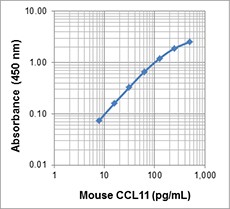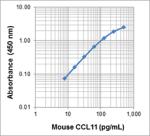- Clone
- Poly5222 (See other available formats)
- Regulatory Status
- RUO
- Other Names
- Eotaxin, Eotaxin-1, small inducible cytokine subfamily A, member 11 (SCYA11)
- Isotype
- Goat Polyclonal Ig
- Ave. Rating
- Submit a Review
- Product Citations
- publications

| Cat # | Size | Price | Quantity Check Availability | Save | ||
|---|---|---|---|---|---|---|
| 522204 | 50 µg | 300€ | ||||
CCL11, also known as Eotaxin, is a small cytokine belonging to the CC chemokine family. The full length of CCL11 is 97 amino acids (a.a.) with a 23 a.a. signal peptide, which is cleaved to generate a 74 a.a. mature protein. The molecular mass of CCL11 is about 10 kD, and its gene is located on the q arm of chromosome 17. CCL11 expression has been found in normal tissues such as smooth muscle and small intestine. Endothelial cells, smooth muscle cells, epithelial cells, alveolar macrophages, and eosinophils are known to produce CCL11. Mouse CCL11 shares a 61% and 96% amino acid sequence identity to both human and rat, respectively.
CCL11 is produced when inflammatory cytokines, such as IL-5 and TNF-α, stimulate lung endothelial cells, fibroblasts, and smooth muscle cells in response to allergens. As a potent eosinophil chemoattractant, via binding to its major receptor, CCR3, CCL11 efficiently induces the accumulation of eosinophils, a response associated with allergic inflammation. Therefore, atopic dermatitis, asthma, and parasitic infections are a few of the eosinophilic inflammatory diseases directly related to CCL11. In addition, CCL11 induces the formation of blood vessels and other angiogenic responses which are accompanied by inflammatory infiltration; it has been shown to regulate tumor development.
Product Details
- Verified Reactivity
- Mouse
- Antibody Type
- Polyclonal
- Host Species
- Goat
- Formulation
- Phosphate-buffered solution, pH 7.2, containing 0.09% sodium azide.
- Preparation
- The antibody was purified by affinity chromatography and conjugated with biotin under optimal conditions.
- Concentration
- 0.5 mg/ml
- Storage & Handling
- The antibody solution should be stored undiluted between 2°C and 8°C. Do not freeze.
- Application
-
ELISA Detection - Quality tested
- Recommended Usage
-
Each lot of this antibody is quality control tested by ELISA. For ELISA detection applications, a concentration of 0.5 µg/mL is recommended. To obtain a linear standard curve, serial dilutions of CCL11 recombinant protein ranging from 500 to 7.81 pg/mL is recommended for each ELISA plate.
It is recommended that the reagent be titrated for optimal performance.
- Application Notes
-
ELISA Detection: The biotinylated Poly5222 antibody is useful as a detection antibody for a sandwich ELISA assay, when used in conjunction with purified L403H11 (Cat. No. 683202) antibody as the capture antibody.
Note: For testing mouse CCL11 in cell culture supernatant, serum, plasma and other biological fluids, BioLegend's LEGEND MAX™ Kits (Cat. No. 443907 & 443908) are specially developed and recommended.
- RRID
-
AB_2686954 (BioLegend Cat. No. 522204)
Antigen Details
- Biology Area
- Angiogenesis, Cell Biology, Immunology, Neuroinflammation, Neuroscience
- Molecular Family
- Cytokines/Chemokines
- Gene ID
- 20292 View all products for this Gene ID
- UniProt
- View information about CCL11 on UniProt.org
Related FAQs
- How many biotin molecules are per antibody structure?
- We don't routinely measure the number of biotins with our antibody products but the number of biotin molecules range from 3-6 molecules per antibody.
Other Formats
View All CCL11 (Eotaxin) Reagents Request Custom Conjugation| Description | Clone | Applications |
|---|---|---|
| Biotin anti-mouse CCL11 (Eotaxin) | Poly5222 | ELISA Detection |
Compare Data Across All Formats
This data display is provided for general comparisons between formats.
Your actual data may vary due to variations in samples, target cells, instruments and their settings, staining conditions, and other factors.
If you need assistance with selecting the best format contact our expert technical support team.

 Login / Register
Login / Register 













Follow Us